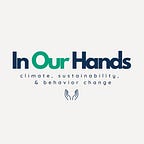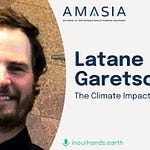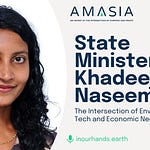In this episode from our archives, Ramanan Raghavendran speaks with Roland Geyer, a Professor at the Bren School of Environmental Science and Management, University of California at Santa Barbara. Since 2000, Dr. Geyer has worked with a wide range of governmental organizations, trade associations, and companies to develop the science and knowledge necessary to reduce the environmental impact from industrial production and consumption. In this conversation, they discuss the fallacy of eco-efficiency and how to avoid green-washing in corporate climate efforts.
Full transcript available above. This episode is also available on Apple Podcasts and Spotify.
In Our Hands is a production of Amasia. Follow these links for more about our firm, the Amasia blog, our climate fiction podcast, and Ramanan’s blog.
Highlights
[00:06:21] Fallacy of Eco-Efficiency
[00:11:02] Examples of Net Green
[00:15:02] Making Net Green Possible
[00:22:18] Labor and the Environment












